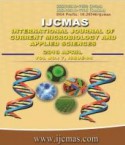


 National Academy of Agricultural Sciences (NAAS)
National Academy of Agricultural Sciences (NAAS)

|
PRINT ISSN : 2319-7692
Online ISSN : 2319-7706 Issues : 12 per year Publisher : Excellent Publishers Email : editorijcmas@gmail.com / submit@ijcmas.com Editor-in-chief: Dr.M.Prakash Index Copernicus ICV 2018: 95.39 NAAS RATING 2020: 5.38 |
Pyogenic infections are one of the most common clinical complications following surgery and trauma. Prompt antimicrobial therapy is needed to reduce the morbidity of these infections. Rationale use of antibiotics is the need of the hour to curb the rising antimicrobial resistance. A retrospective study was undertaken to identify the microbial profile with their antibiogram among the pus culture isolates in a teaching tertiary care hospital from January 2017 to June 2017.504 pus culture samples processed at the microbiology lab were analyzed. The isolates from positive pus culture were identified by standard protocols and antimicrobial susceptibility patterns were identified by CLSI guidelines. Positive pus cultures were obtained in 59.92% (302/504). Gram positive bacteria accounted for 31.9 % (97), Gram negative bacteria 67.12% (204) and Candida spp 0.99% (3) with predominance of S. aureus 26.32% (80) followed by E. coli 13.82% (42) and K. pneumoniae 13.49% (41). 17.5% of S. aureus was MRSA and 100% sensitive to vancomycin. 23.61% of E. coli and 25% of K. pneumoniae were ESBL producers. Majority of Gram negative isolates were sensitive to imipenem and meropenem. The present study provides useful information on the microbial profile and their antimicrobial susceptibility pattern of the pus culture isolates that may help in the formulation of antibiotic policy for pyogenic infections.
 |
 |
 |
 |
 |